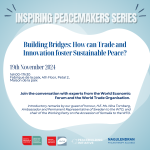You are a MINT student specialising in the “Conflict, Peace, and Security” (CPS) track, Co-President of the Peacebuilding Initiative, and intern at the accession division of the World Trade Organisation (WTO) — how did your experiences and interests lead to your dedication to peacebuilding?
My background in international relations provided a foundation for understanding global affairs and how local and international stakeholders interact in the international system. This knowledge is important in peacebuilding and pushed me to reflect on the issues that mattered to people worldwide, as well as those closer to my heart. Hence I developed a strong interest in the development of my country, Comoros, the continent of Africa, and least developed countries (LDCs). I also got a sense of the insecure world we live in marked by conflicts and inequalities making it difficult for many to meet their basic needs. So, how could there be development without peace and security? This realisation influenced every decision I made for my studies and my career.
The interdisciplinary nature of the MINT CPS program provides useful theoretical and practical knowledge to strengthen my expertise. I joined the Peacebuilding Initiative to support empowering the youth in this field through cross-generational partnership. This aligns with my goals as a young peacebuilder and has been an enriching experience. I also joined the WTO Accessions Division to learn how trade and multilateralism can foster peace through the Trade for Peace Programme and LDCs' development. Comoros’ recent WTO accession further sparked my interest. It is a timely opportunity to see my country making its way into the international trading system to achieve its development goals. These experiences have shaped my commitment to peacebuilding for development from various angles.
The "Inspiring Peacemakers Series" seeks to connect youth interested in peacebuilding to career professionals, and the next event “How Can Trade and Innovation Foster Sustainable Peace” is hoping to address the nexus between trade and peace. In your eyes, how do the two fields intersect and how do you think trade can contribute to peace?
I imagine peace as a network of interconnected elements and trade as one of the elements supporting the system. Peace means different things to different people, from the absence of conflict to food security and access to stable jobs. Trade can contribute to peace by fostering socio-economic growth and raising living standards. It can help create the conditions where diverse socio-economic visions of peace can be realised.
The event will feature Kershia Cavele from WTO and Sean Doherty from the World Economic Forum (WEF). Tell us about the event, and what are you hoping to learn?
This second session of the Inspiring Peacemakers Series builds on our first event, which explored the pathways to a career in peacebuilding for the youth. To expand the conversation and because we believe in an interdisciplinary approach, we will discuss the links between trade, innovation, and peace. The event offers an exciting opportunity for learning and networking for students as our panellists bring unique perspectives and relevant experiences. This is also a field that deeply interests me and might interest many, so I hope to learn about the different mechanisms through which this approach can foster sustainable peace and the role of the World Economic Forum and the WTO in this process.
What, to you, is the way to peace?
The way to peace lies in creating societies where people can thrive individually and collectively while respecting each other. Achieving this vision requires a commitment to empowering the various agents of peace like the youth, the future leaders of those societies. This commitment is at the heart of the Peacebuilding Initiative's mission.




